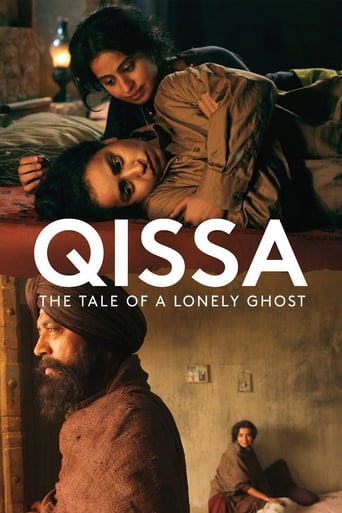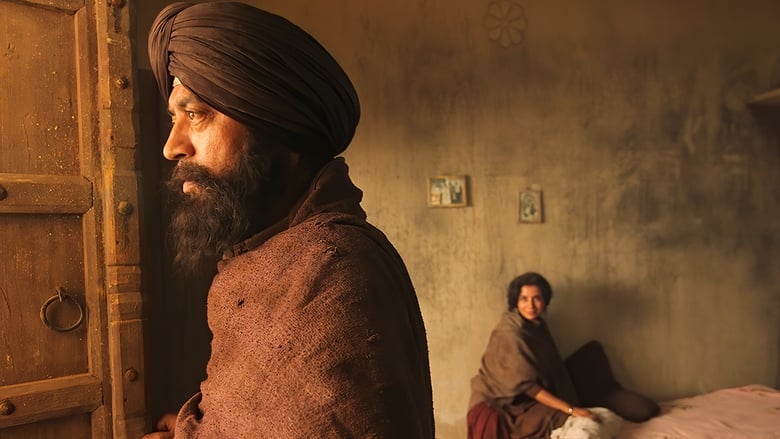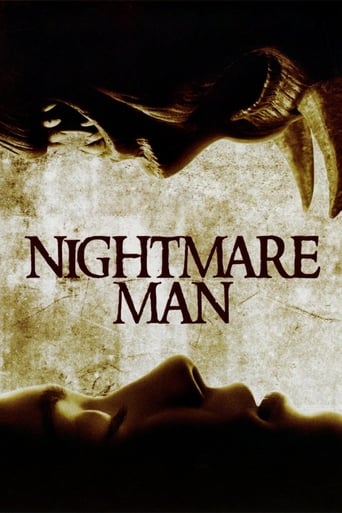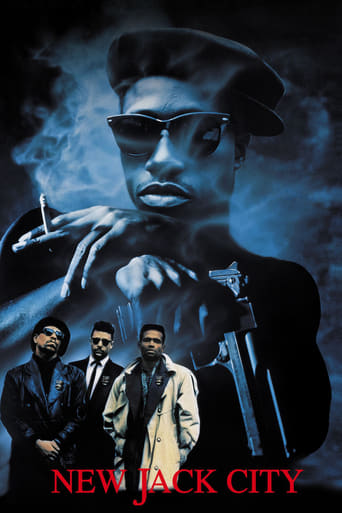

Qissa (2013)
Set in post-colonial India, Qissa tells the story of Umber Singh, a Sikh who is forced to flee his village due to ethnic cleansing at the time of partition in 1947. Umber decides to fight fate and builds a new home for his family. When Umber marries his youngest child Kanwar to Neeli, a girl of lower caste, the family is faced with the truth of their identities; as individual ambitions and destinies collide in a struggle with eternity.
Watch Trailer
Cast


Similar titles
Reviews
Touches You
Simply A Masterpiece
Unshakable, witty and deeply felt, the film will be paying emotional dividends for a long, long time.
Exactly the movie you think it is, but not the movie you want it to be.
Qissa is an Indo-European co-production in the language of Punjabi and it seems to be a movie made for film festivals. It is reminiscent of Matrobhoomi: a nation without women, partly because it is based on a similar theme of female foeticide, except here it is presented like a folk fantasy story where the female-child is not killed, but is just undesirable. In this movie the lead protagonist played by Irfan Khan is a Punjabi man who lost everything during the partition civil war, and becomes obsessed with having a male-child to continue his generation. But his wife has already given birth to three female children, so when she gives birth to the fourth one, he wants it to be a boy; want is perhaps a weak word, he NEEDS it, and will not accept a girl-child.The viewer is left rather puzzled because when his fourth child is born, the midwife says "Congrats" and the father is elated announcing "It's a boy, a boy has been born in my house" but the mother herself says in protest "Why don't you kill me already" On what should be a jubilant occasion, the mood is very sombre. The puzzlement continues to haunt the viewer as the boy grows up, that something is a bit amiss about this boy. This boy is looks like a girl a little, he is weak and his sexuality seems to be confused. Then when the boy is now an adolescent and is getting female attention, he does not seem to reciprocate, and at the same time he seems to be struggling to try to be a typical boy who does show interest. It is only when he is married to a girl and his father makes advances on the girl because he wants a boy, does it dawn on the viewer: the fourth child was a girl too. The movie is depressingly slow from start to finish, the best way to describe it would be by the movies tag line --lonely. It maintains its depressing, melancholic mood throughout, supported by a camera that is always moving, but always moving slowly. Also everybody seems to be so serious and the actors all emote very slowly, dragging out scene after scene. The tedium grows, but as the reality dawns on the viewer why it is so, it suddenly becomes hauntingly effective. Unfortunately, when the movie goes into magic realism mode towards the end with the father who is now a wandering lonely ghost, it loses its effectiveness, because the supernatural aspect was not required in this story at all. This movie could have been a brilliant meditation on the sexuality and the identity crisis of a girl who is made to live like a boy, but they shortchange this for a rather bewildering supernatural climax.This is a rather modest production, technical values are just adequate to tell its simple tale, most of it is shot on location and camera- work is pedestrian. The best part is the acting, Irfan Khan is in his elements here and is able to bring out the obsessive quality of the father. The background score is also effective and haunting.The movie is rather lonely to sit through, but it is worth it the end. I was bored for the first hour, but by the time I had realized, though I had a nagging suspicion that the boy is a girl, I was gripped in shock and could appreciate the vision of the director Anup Singh.
What if you were the prisoner of desires? What if your construction was nothing but a quicksand of lies? All you gain is a house of cards. A ghost, so lonely by the defeat of his realism walks down the Punjab territory. Alas, the land gets bisected by a border, so violent! Such is the tale of Tillotama Shome's Kanwar being morally stabbed behind the curtain of sexuality. Anup Singh's Indian-German film 'Qissa-The Tale of a Lonely Ghost' is a cinematic sensation that goes down deep into your subconscious. In the hour of Partition, a Sikh resident of the now Pakistan seeks shelter in Punjab, India with his wife and three not so desired for daughters. Thus is what Irrfan Khan's Umber Singh, wishing for a boy out of Mehar's (Tisca Chopra) womb. When the fourth daughter is born, he persists on bringing her up as a son. Kanwar, in disguise of a son prepares herself as a boy. An adolescent love gets injected in the form of Neeli (Rasika Dugal) followed by a marriage. The beginning of a new relationship calls for the end of what was so far a sexual illusion.Director Anup Singh does true justice in maintaining the patience of being brave as he successfully makes the non-chronological phantasm work in a meter of realism as well as surrealism. The second half of the story takes a sudden realistic turn as it is revealed in the posters of the film. If realism is the false fall, surrealism gives the definite land in the plot.With the evergreen brilliance of Irrfan Khan, the acting has reached a summit of what one can hardly comment about. The soliloquy presented to the dead sands is like a perpetual cycle of fate that cries in the tone of,"Naa aadmi, naa aurat. Naa jeev, naa pret." Tillotama Shome, famous for her serious portrayals has once again nourished the excellence of her virtue. With an innocent boldness and an intense artistry, her character is like a flame, the delusion of which stays on even after it gets extinguished. Tisca Chopra and Rasika Dugal has also contributed their magnificence in sculpting this master class.A warm tone cinematography throughout the film along with the immaculate sound mixing has successfully provided for balancing the tension with the 'what happens next' feeling. A well edited synchronization with the proper synthesis of music has given the film a strong circumference.The audience leaves the theatres with some serious question marks haunting their grey scale. The well cooked delicacy of a sexually exposed Kanwar with the fog of Neeli's existence is the best abstract that gets nailed into your brain. The posters came out with a Mira Nair quote terming the film as a "masterpiece." 'Qissa-The Tale of a Lonely Ghost' is not a onetime watch. Watch, leave and watch again
I had the pleasure of watching "Qissa" (Punjabi, English sub-titles) at its North America premier at the Sikh Lens Film Festival in Orange County, CA on Nov 22nd, 2014. This is a complex, heart-wrenching tale powerfully etched by the dexterous hands of Anup Singh. The movie starts off with the backdrop of the 1947 Partition of India and the theme of loss runs right through it. The film then goes on to mercilessly expose the ridiculous limits a patriarchy must go to, to preserve itself. Umber (played by the incomparable Irrfan Khan) is a Sikh man uprooted with his wife and three young daughters from his village (in Pakistan) and forced to flee to the new India as a result of Partition. Soon after he is somewhat reestablished in India, his wife delivers a 4th daughter; at this point Umber declares he's had a son and brushing aside all objections proceeds to raise the girl as a boy even up to the point of marrying her off as a man. The absolutism of the patriarchy, accompanied by the threat of violence runs as an undercurrent throughout the film — the women mostly watch on helplessly until Umber's daughter-in-law unexpectedly decides to question the status quo. But it is too late and the story unfolds inexorably into a disaster for all. Thematically Partition as the starting point for the film is a powerful and relevant one. The patriarchy that invented the concept of "honor" off the backs of its helpless women then greatly exploited it during Partition - women, girls on all sides and as a matter of priority, were raped, mutilated, and devastated in ways unimaginable. The same patriarchy so bound to its feudal ties, the land it owned and a limited imagination, could only consider sons bearing its name. And this became so much of a part of the reality that not having a male heir became as much a matter of economic devastation as of social shame. As the director and screenplay writer, Anup Singh displays admirable restraint with limited dialog, nuanced performances elicited from his cast, and the straightforward telling of an explosive story. A metaphorical twist in the story leaves you stunned yet believing. I would be remiss if I did not call out the three women actors - Tilottama Shome, Tisca Chopra and Rasika Dugal - who were perfect in their respective roles; each held her own vis-a-vis Irrfan Khan. All in all a treat and I am rooting for this one as India's entry for Best Foreign Film at the 2014 Oscars!
Qissa is a visually stunning film with multiple concurrent themes running through it, ranging from patriarchy, partition, parochialism and even briefly same sex relationships. Partition was vividly depicted in a more sensitive way than I've seen before on screen. The film turns out fine performances from an array of actresses including Tisca Chopra and Tillotama Shome. It's also probably no coincidence that Irrfan Khan, a Muslim, was cast in a Sikh role; something that adds an unspoken gravitas to the part of Umber Singh given the historical context. The multiple scenes shot around wells will resonate with any person whose family was scarred by the partition of the Punjab; from either side.The presence of German funding is evident (although India's NFDC are part-funders); this is an independent non-commercial drama with a visible budget behind it. This lends an almost epic feel to some of the earlier scenes that would have been surely lacking without the European financial input. The score, by a French composer I believe, is excellent and an integral part of the film; although heavy on Indian motifs, it sounds decidedly un-Indian in structure. That's not a criticism, rather a refreshing bonus for the film that benefits from its soundscape. The music is also suggestive and never overpowering. The two vocal tracks are from the outstanding Nooran Sisters, Punjabis themselves, with thankfully no mainstream Bollywood singers in sight.As always Khan delivers an impeccable performance although the character does come across as one-dimensional at times; probably more to do with the script that his actual performance. The stand-out performances come from Shome as the 'son' Kanwar, and Raskia Dugal as his gypsy wife, Neeli. The chemistry, friction, pain and ultimately tenderness between these two is the highlight of the film. I would argue that Raskia Dugal almost upstages the other leads with her brilliant performance, particularly in the later scenes where the couple have fled their home. Kanwar's confusion also comes across as genuine, a credit to Shome's portrayal in a difficult role, while the nude scene, a critical part of the plot- is sensitively handled.My criticism of the film comes with the 'ghost' scenes; had the English title of the film not had "The Tale of a Lonely Ghost" appended to it (an unnecessary expanded titling, in my opinion); the initial scenes where Khan returns are momentarily confusing. It's not clear if he is a ghost or not, although that ambiguity may be intentional- or possibly I was a bit slow to pick up on it despite seeing his apparent demise earlier. Although parts of the film come across as dream-like, these initial ghost scenes don't and for that reason it's unclear if Kanwar is imagining Khan's appearance or not. These are minor points in an otherwise good film though, but the film still throws open many questions such as who and why where others complicit in the deceit, and why did the mother not put up resistance to the charade, amongst others.This is the kind of film that will do very well at film festivals, and deservedly so, but is probably too complex and intelligent for wider mainstream appeal-- in say a way some more accessible Deepa Mehta films would. It will be interesting to see what reception the film receives when it is ultimately released in India.Director Anup Singh has done a good job of bringing to life an intricate story that is unlike any other recent Indian film out there. Recommended.









